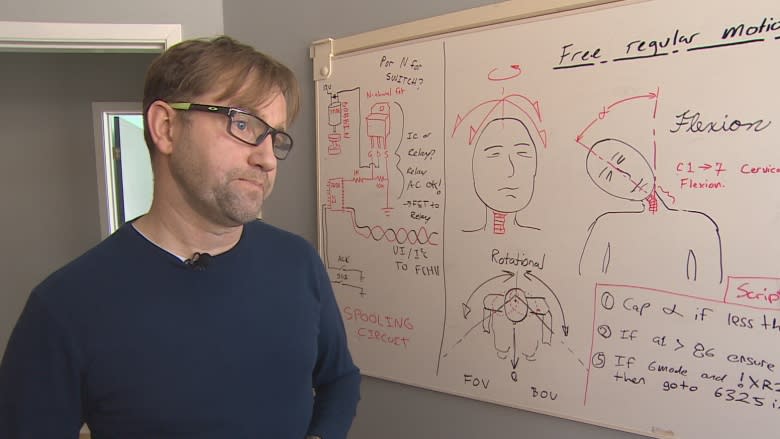Nova Scotia startup pioneers device to treat neck pain
A Bridgewater, N.S., startup is hoping its pioneering Neck Tronics invention will put an end to chronic neck issues and make rehab and assessment easier.
The idea of a machine to treat neck pain comes from chiropractor Bill Smith, who was working on a patient one day at his office and thought there had to be a better way.
"I've been dealing with neck injuries for 20 years and I had this idea after I saw a patient three years ago. I started playing around with different ideas on how to strengthen the neck," said Smith.
The company is being purposefully vague about how the device works to avoid competition, but it has received hundreds of thousands of dollars from the government and promises to be an "innovative ... solution for diagnosing and treating whiplash and concussion-related neck injuries," according to its website.
"It's really hard to get patients to do what you need them to do, even in a clinical setting," Smith said. "At home, if they tell you they are doing strengthening, there's a good chance they aren't doing it right."
His idea led to the first prototype and the buzz just keeps growing.
It includes the backing of the National Research Council, which gave Neck Tronics $50,000 two years ago to develop the idea.
Just a few weeks ago, the council put in another $202,000 to take the prototype to the next level.
"The response we have got in the past six to eight weeks has been amazing," said Smith.
'Nothing in the world like this'
In order to access that money, Smith's company needs to raise money from the private sector.
He's hoping the invention is a game-changer in the medical world.
"We had our patent lawyers do a global search and there is nothing in the world like this," he said. "We went to Germany, to the largest medical trade show in the world and we feel confident we have developed a significant technology for the neck."
Smith says the machine, which is being worked on by five engineers in the Bridgewater office, can specifically measure the range of motion for every movement.
"We'll be able to specifically strengthen in a particular direction and start isolating specific muscle movements in the neck. We are able to quantify the injury to the neck," Smith said.
Insurance companies interested
The insurance industry is particularly interested in the machine.
"We met with two senior adjusters for a large insurance firm and they got it right away," said Smith. "They understood we are quantifying the injury itself."
Once they fine-tune their second prototype, the next phase of development will take it to one of NSCC's campuses in Dartmouth where they'll start testing it on human subjects.
Possible human testing by August
"This is a Class II medical device so the amount of regulatory work you need to go through is huge, so the engineers are working full time on meeting the compliance standards before a person can actually use it," said Smith.
The company hopes the device will be ready in August for human testing. If that goes well, the company is anticipating it hits the market by spring 2018.



